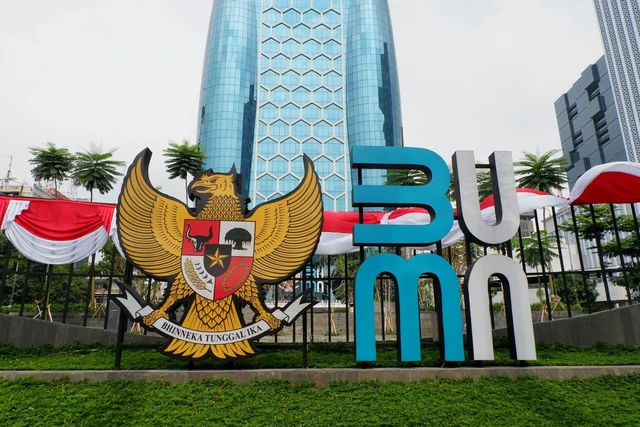A recent study by Transparency International Indonesia (TII) revealed that 165 out of 562 commissioner seats in State-Owned Enterprises (SOEs/BUMN) are occupied by politicians, raising concerns about political patronage and weakened governance.
The research, conducted between August 13 and September 25, 2025, covered 59 SOEs and 60 sub-holdings, mapping the backgrounds of all 562 commissioners. The study found that 172 commissioners came from the bureaucracy, 165 from politics, 133 from professional backgrounds, 35 from the military, 29 from law enforcement, 15 from academia, 10 from mass organizations, and 1 was a former state official.
“Commissioner positions in SOES are dominated by bureaucrats and politicians,” said TII researcher Asri Widayati during a public discussion titled “Komisaris Rasa Politisi: Perjamuan Kuasa di SOES” on September 30.
Among the 165 politicians, TII identified 104 as party cadres and 61 as political volunteers. Party-wise, Gerindra dominates with 48.6% of cadres holding commissioner seats, followed by Democrat (9.2%), Golkar (8.3%), PDI-P, PAN, and PSI (5.5% each). No PKS cadres were listed among commissioners.
TII highlighted the declining role of professionals in SOEs governance. Only 14.9% of commissioners in holding companies and 32.1% in sub-holdings came from professional backgrounds.
“This imbalance increases the risk of conflicts of interest, especially when bureaucrats act as both regulators and executors,” Asri warned. “Conflicts of interest are a risk area for corruption.”
Patronage System and Governance Concerns
Constitutional law expert Feri Amsari from Andalas University criticized the appointments as a form of political patronage — rewarding allies after the election.
“This is patronage, paying back political debts from the campaign season. Everyone gets a share,” Feri said during the same discussion.
He particularly criticized the practice of appointing deputy ministers as SOES commissioners, calling it unconstitutional and a conflict of interest.
“It’s problematic when a deputy minister holds multiple positions. This goes against good governance,” he noted.
Feri urged President Prabowo Subianto to take leadership in improving governance, criticizing his current approach as “prioritizing power-sharing over professionalism.”
Legal Reforms and DPR’s Response
The House of Representatives (DPR) has passed the revised SOES Law, introducing measures to restrict political interference. The law bans ministers and deputy ministers from holding commissioner positions, following Constitutional Court Decision No. 128/PUU-XXIII/2025. It also transforms the Ministry of SOEs into Badan Pengaturan SOES (BP SOES), a new supervisory body.
“With the new law, we hope SOES will operate more professionally and effectively,” said DPR Speaker Puan Maharani at the parliament complex on October 2, 2025.
Meanwhile, Gerindra Party’s Sufmi Dasco Ahmad, who also serves as DPR Deputy Speaker, responded to TII’s findings by saying that the number of political cadres in SOES “is not as many as suggested” and promised to verify the data.
TII’s findings, expert critiques, and the recent legal reforms highlight persistent political entrenchment in SOES governance. While the new SOES Law marks a step toward professionalization, public scrutiny remains crucial to ensure implementation and curb political patronage in state-owned enterprises.
Source: Kompas, TribunNews
Photo Credit: Abdurrohim Husain/Shutterstock


